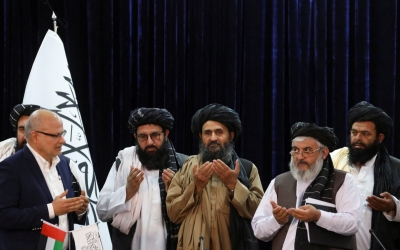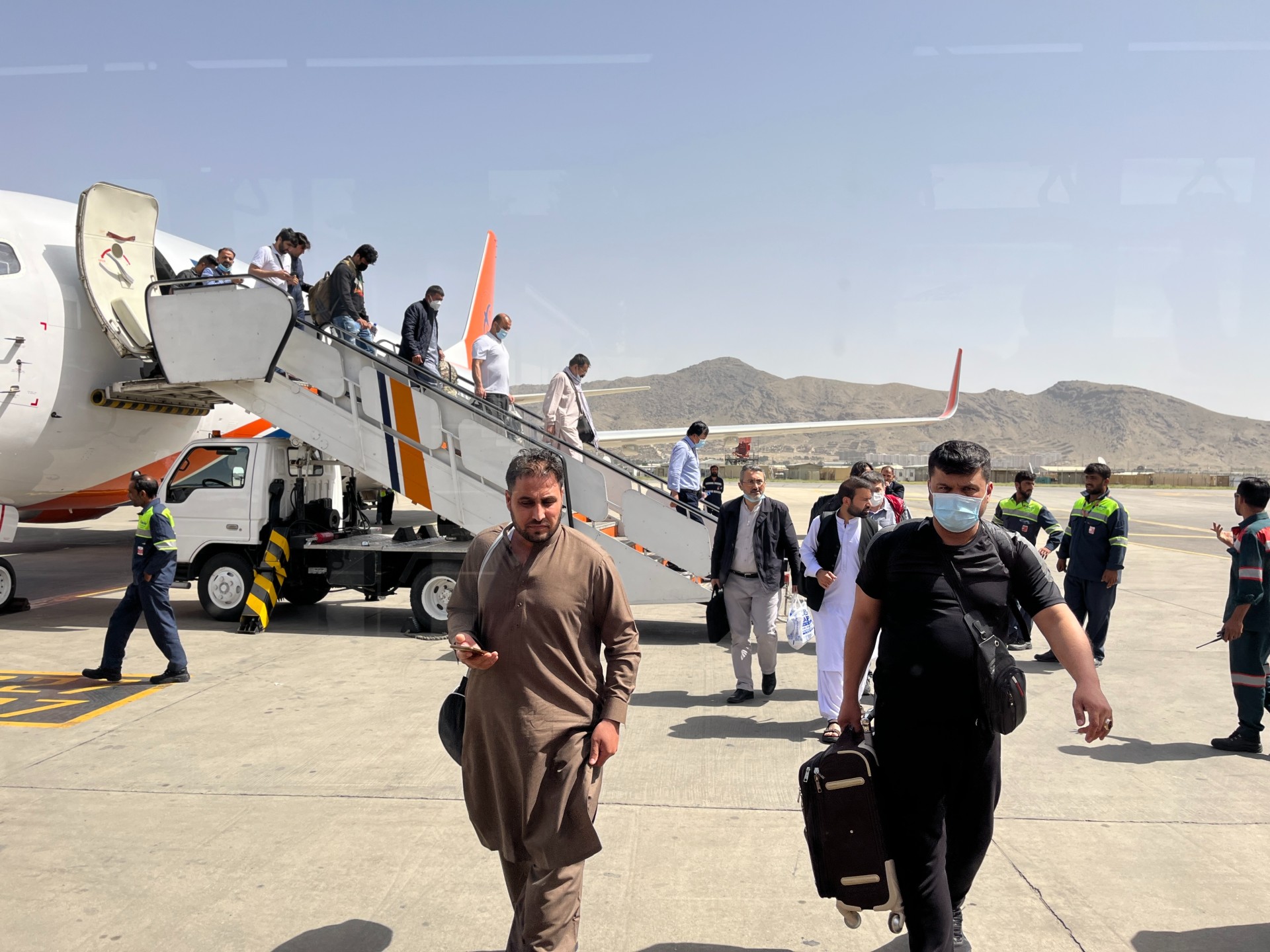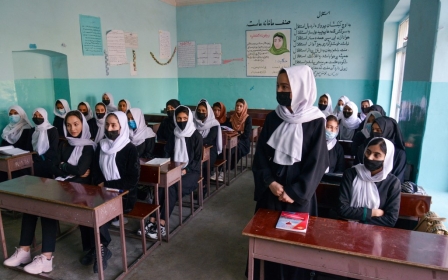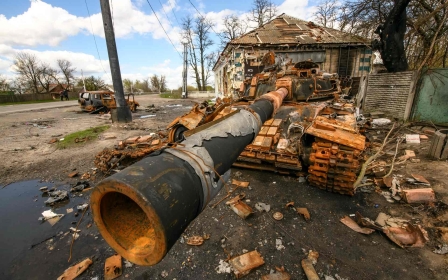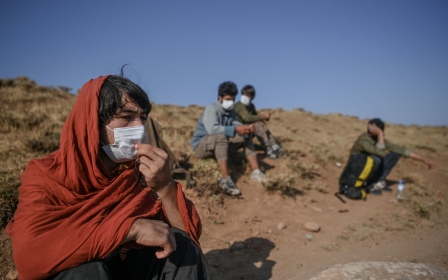On an Istanbul-Kabul flight, refugees and emigres prepare to see a new Afghanistan
The KamAir flight may be heading to the Taliban-led Islamic Emirate of Afghanistan with Afghans who have fled their country, but there is little sense of fear or trepidation on this plane.
From the check-in terminals to the gate and through the boarding process, everything carries on as normal.
Crowds of men, women, and children clamour to get on board the packed aircraft; the safety announcements are read in Pashto, Dari, and English; and the flight crew carries out the usual pre-takeoff duties for a journey that now costs $480 each way.
As with most flights from Istanbul to Kabul, the passengers are a mix of families from nearby European nations visiting family, businesspeople, NGO workers returning from quick R&R trips abroad, and of course, deportees.
But one group is conspicuously absent. Not so long ago, foreign military and security contractors - some in the military mould, others in suits - took up many of the business class seats, but not since the Taliban kicked out the western-backed government in August.
New MEE newsletter: Jerusalem Dispatch
Sign up to get the latest insights and analysis on Israel-Palestine, alongside Turkey Unpacked and other MEE newsletters
For many on the four-and-a-half-hour flight, this is their first trip back to Afghanistan since former president Ashraf Ghani fled to Abu Dhabi and the Taliban retook control.
After months, even years, away, they say they want to see the situation with their own eyes.
Fahim, whose family has lived in the UK for the last 10 years, is one of the travellers hoping to see first-hand how life has changed under the Taliban, if at all. He was a teenager when the group first came to power in 1996.
“I was certainly old enough to remember it happening, and going to see President Najib’s body hanging from Ariana Square, but I wasn’t old enough to fully understand what was about to befall us,” he says, recalling the hundreds of people who came to see the corpse of the nation’s last communist leader, who had been killed by the Taliban.
Over the last decade, Fahim has been coming back to Afghanistan at least once a year. But Covid-19 restrictions and the initial blowback of the Taliban takeover have made it impossible over the last three years.
So, when his family wanted to holiday in Istanbul, he saw a chance to also visit his brother and parents in Afghanistan. “I couldn’t come all the way to Turkey and not at least try to go back to Kabul,” the 39-year-old says.
After a week of playing tourist in Istanbul’s historic Sultanahmet neighbourhood, Fahim saw his family off on their flight back to the UK. Once he had dropped off his wife and children at Istanbul Airport, Fahim headed towards the neighborhood of Zeytinburnu, which has been home to the city’s Afghan community for decades.
As he walked past neighbourhood restaurants selling qabeli (browned rice cooked with beef and covered in raisins and carrots) and Afghan-style ice cream he grew more and more excited about his trip to Kabul. “It had that little feel of home,” he says.
'There are parts of Badakhshan where the mountains look like they’re just made of layers of different colours, that’s what I want to see again'
- Fahim, Afghan emigre
Finally, after 24 hours of anticipation, he headed to the airport himself to reunite with his brother and parents.
“I felt like they were pulling me towards Afghanistan,” he says from a window seat near the front of the plane.
Fahim has high hopes for his visit to Afghanistan. He wants to try to head north to the provinces of Kunduz and Badakhshan, two places he remembers fondly.
“There are parts of Badakhshan where the mountains look like they’re just made of layers of different colours, that’s what I want to see again.”
During the 20 years of foreign occupation, the provinces grew increasingly dangerous as the Taliban increased their foothold in both. In fact, in 2015 Kunduz became the only province to briefly fall back into the hands of the Taliban during the time of the western-backed Islamic Republic.
Now, with the foreign occupation over, the western-backed government having fled, and the war seemingly at an end, Fahim feels it is a good time to try and recapture his memories of Badakhshan and Kunduz.
But he is quickly brought back down to earth by other passengers, who remind him of the reports of fighting between the Taliban and armed rebel groups in nearby Baghlan province. Although Fahim says that he still wants to try.
If he can’t make it to the north, though, he says he wants to head to the centre of the country and finally make a trip to Bamiyan, the central province that is home to the caves that housed the world’s largest freestanding Buddhas until the Taliban blew them up in 2001.
To begin with though, he wants to enjoy two common pastimes for men in Afghanistan.
“After this long flight, I just want to go straight to a hamam.”
His other wish comes quick much sooner than he expected when a passenger behind him hands him a packet of chewing tobacco.
Rising expenses
Next to Fahim is Rahmatullah, a middle-aged employee at an international NGO, who tries to reassure another nervous passenger one row behind them. “Everywhere in Afghanistan is safe now,” he says.
But the statistics do not bear out his optimism. Only hours before the passengers boarded, there were reports of explosions in the cities of Kabul and Mazar-e Sharif, the capital of Balkh province.
A spate of deadly attacks claimed by the Islamic State (IS) group killed at least 100 people in the last two weeks of April alone.
IS, a years-long enemy of the Taliban, has continued to pose a formidable threat to safety and security in the country, even though the Taliban had promised that once its war with the western-backed government was over, order would return to the country.
Even with the risks, people like Rahmatullah don’t have a choice. They have to come to the Islamic Emirate for work. He spent much of the last two decades working for foreign agencies and international NGOs, and was able to save enough to buy a property in Istanbul and get residency in Turkey.
But with Turkey’s economy currently facing more than 70 percent inflation and the continued devaluation of the lira, Rahmatullah has no choice but to go back and forth between the two countries every two months so he can keep his NGO job in Kabul.
“Right now, everyone’s main concern is money. I’m lucky I at least have a job now,” he says.
Since the arrival of the Taliban government, billions of dollars of the Afghanistan Central Bank’s assets have been frozen in the United States.
Additionally, many of the Taliban’s leaders, including current acting ministers, are subject to international sanctions and blacklists, meaning investment and lending in the country have been dramatically reduced.
International NGOs and foreign donors have also cut their spending in Afghanistan.
All of this has led to a situation where the Afghan economy, which was already suffering during the final years of the Islamic Republic, is now at a near-standstill under the Taliban.
Rahmatullah's trips are not easy, though. He has to pay between $1,100 and $1,200 for a roundtrip, including the required Covid-19 tests, which is making him think of bringing his family back to Kabul.
“It’s become too expensive, I can just enroll the kids in Afghan-Turk schools here,” he says.
Of course, he is at an advantage because his children are all boys. It has now been more than 240 days since teenage girls were allowed to attend secondary schools in Afghanistan, despite the Taliban’s repeated claims that they will reopen girls’ high schools.
Other passengers are also looking for ways to bring money into the country.
Obaid, a businessman who works in construction and welding in Dubai, says he hopes that the United Arab Emirates will restart issuing visas to Afghans in light of last week’s deal between the Taliban and an Emirati company to take over certain functions at three Afghan airports.
“Once they restart the visas I want to take as many people as I can so that they have some kind of an income,” he says to another passenger in the passport line.
'What choice do these poor Afghans have'
Not everyone is going back on their own accord, though.
Karimullah is one of about a dozen deportees on the flight. Usually, these Istanbul to Kabul flights are packed with far more deportees. A travel agent in Istanbul told Middle East Eye that there have been days when 150-200 Afghans are given tickets for so-called “voluntary returns”.
“You can tell they’re not voluntary, but what choice do these poor Afghans have,” the agent said.
Karimullah, 19, tried multiple times to reach Turkey from Iran, where he had been living for three years, before he finally made it last year. Each attempt cost him $1,000 in smuggler fees. Once inside Turkey, though, he was constantly worried about being caught by Turkish authorities.
'I don’t know if I should be afraid, but what can I do?'
- Karimullah, deportee
He spent much of the last year evading police and trying to get medical care for a skin condition in Ankara and Istanbul, to no avail. He said that doctors and clinic staff would tell him that they can't treat him without a residency, or at least a visa.
His friends, who are also boarding the flight, were shot in the legs and the hips along the Turkish-Iranian border. “They don’t know which way the bullets were coming from, but they remember the pain of being shot,” he says.
Like the rest of the world, Turkey has no formal relations with the Taliban government, but Ankara, along with Islamabad and Tehran, has been deporting Afghans for months. In fact, Iran and Pakistan never halted their deportations, even during the Taliban takeover last summer. Turkey restarted its deportations in January.
For someone who is about to be deported to a country he hasn’t been to in nearly four years, Karimullah seems calm. He has resigned himself to his fate.
“I don’t know if I should be afraid, but what can I do?” he says.
Like all the others on board the plane, he says he will just have to see for himself if he can survive in a Taliban-controlled Afghanistan.
“People say a lot of things online, but honestly, I think that’s just to sow divisions amongst the people. The only way we’ll know is to go and see everything for ourselves.”
On arrival at the airport, there are International Organisation for Migration staff waiting for them.
Karimullah is fortunate, his father has come to the airport to collect him and even made it into the baggage-claim area to greet his son.
The teenager had never travelled by plane before and was unfamiliar with the rules at Kabul airport. At the baggage claim, he argues for nearly 20 minutes with an airport worker checking luggage tags because he has lost his boarding pass and luggage tag.
The airport worker seems irritated. “What’s wrong with you guys? he asks in frustration. "Why is it as soon as you arrive here you lose everything?”
When the baggage dispute is settled, Karimullah and the other deportees head towards the final customs check and back into a new Kabul to, as they say, “see what it’s really like”.
Middle East Eye delivers independent and unrivalled coverage and analysis of the Middle East, North Africa and beyond. To learn more about republishing this content and the associated fees, please fill out this form. More about MEE can be found here.


